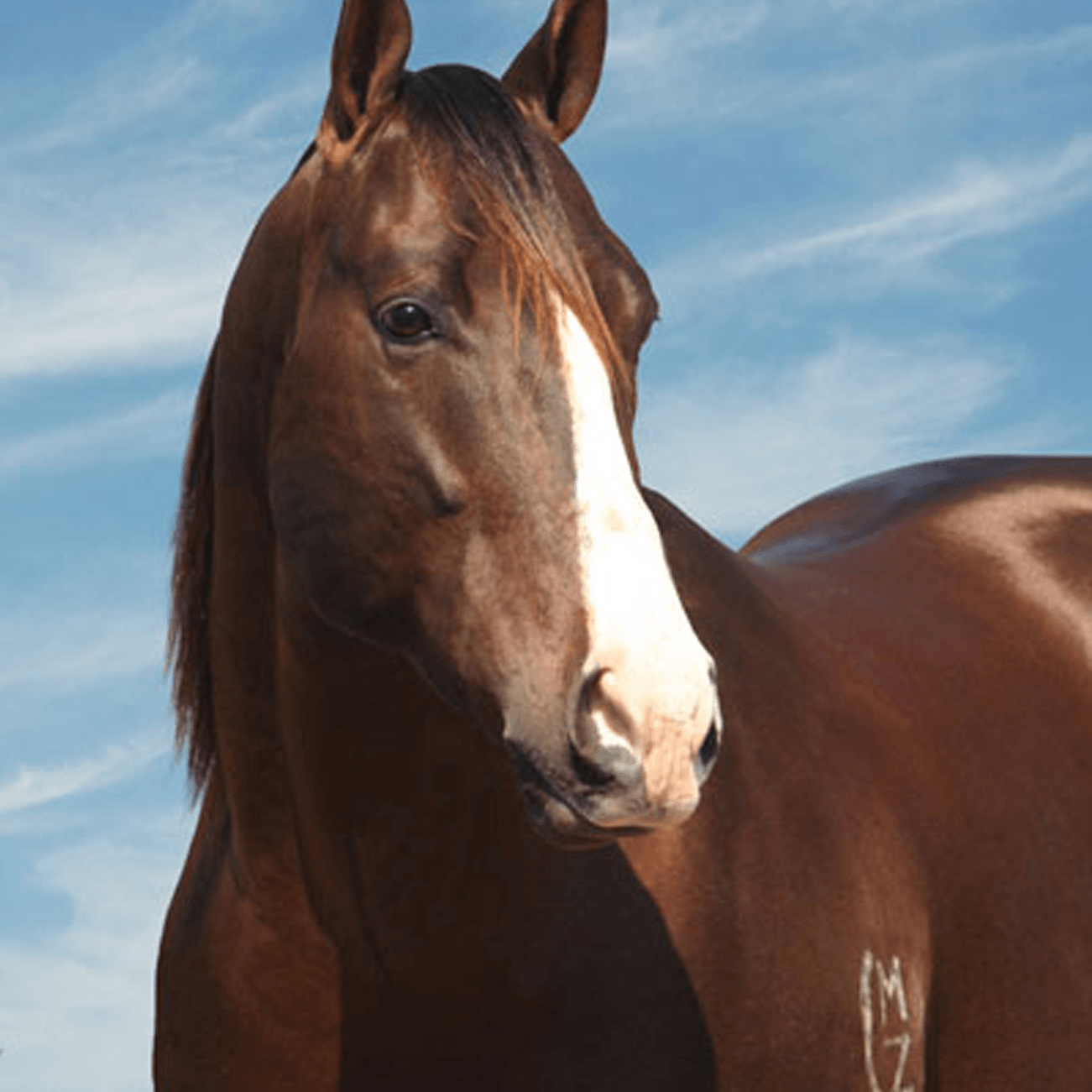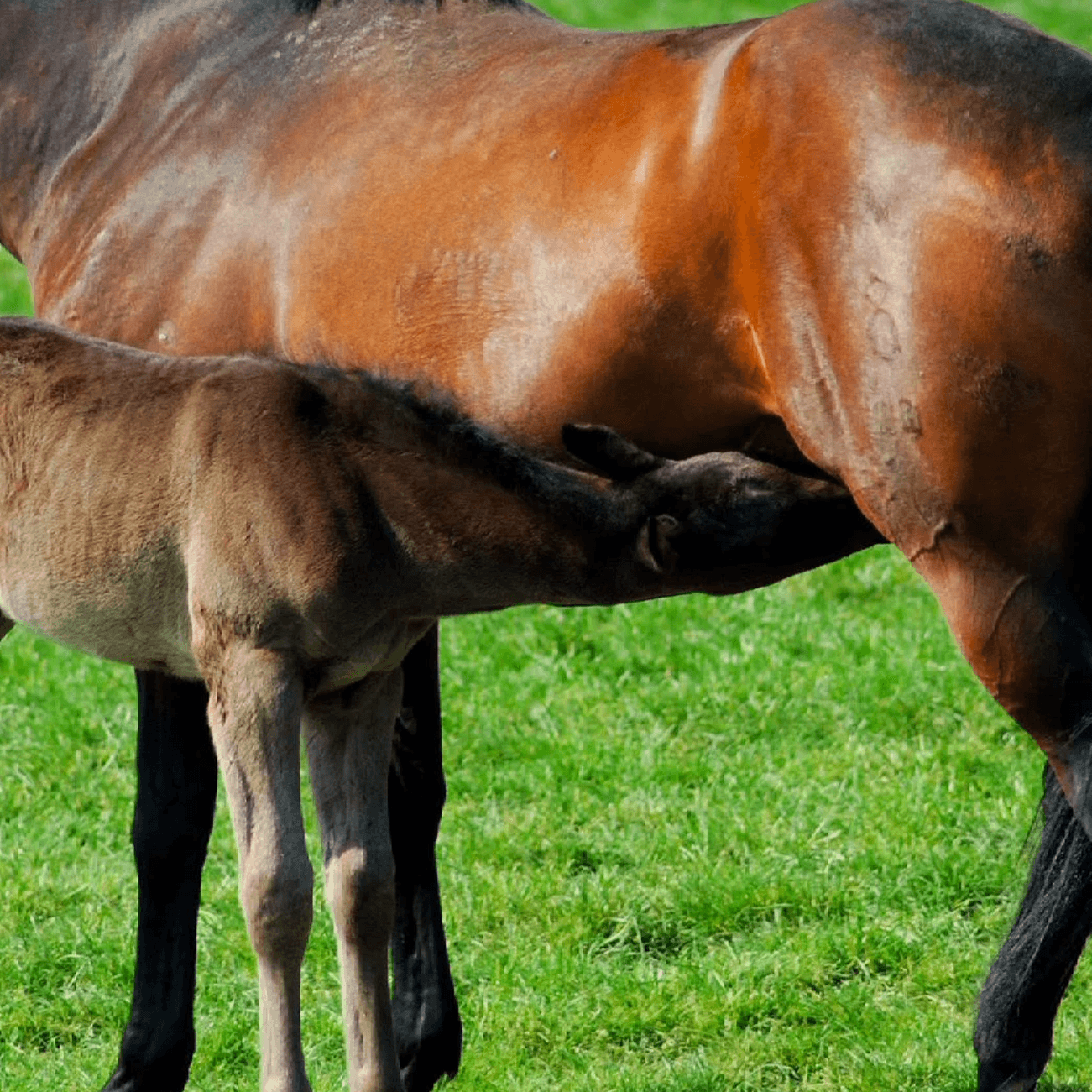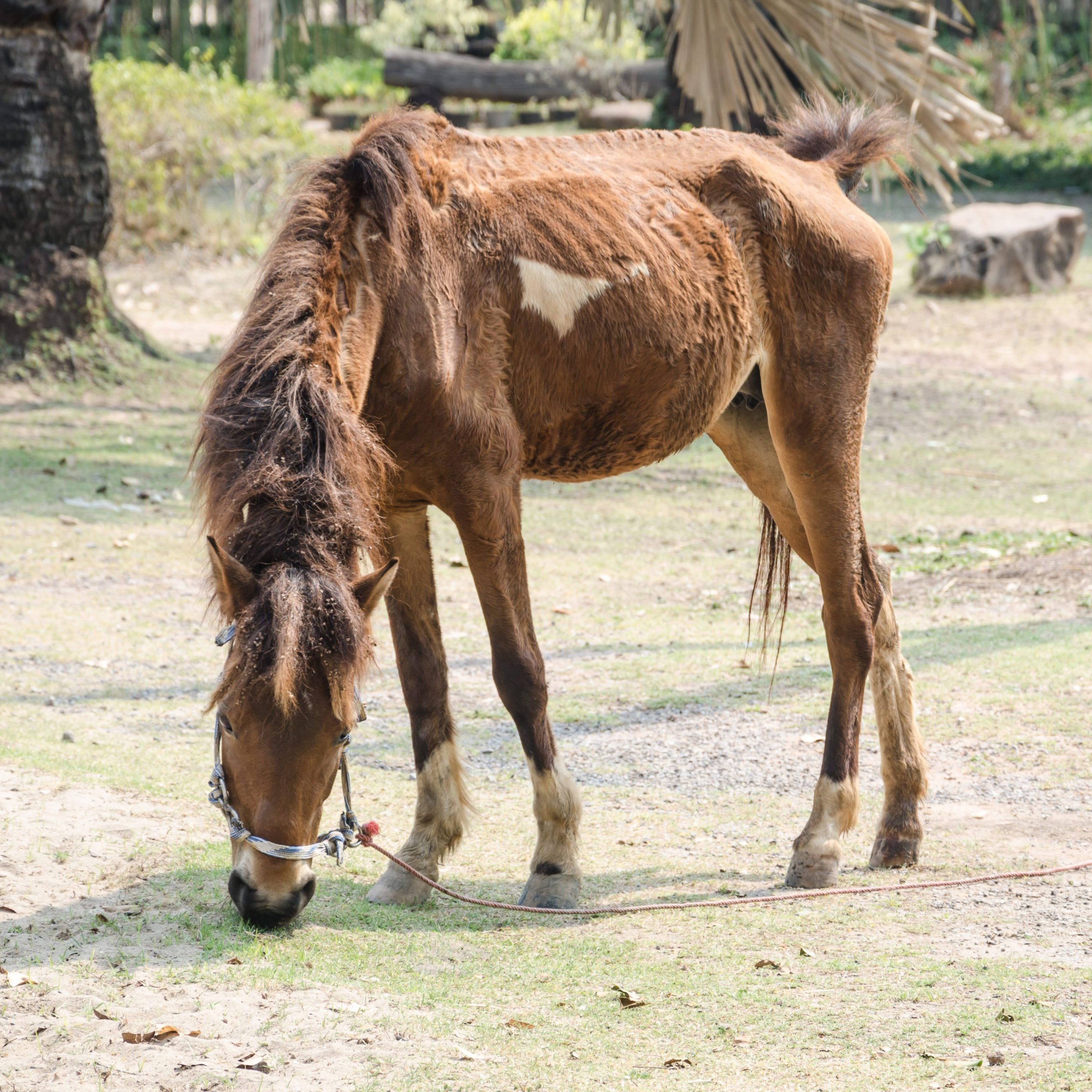Featured
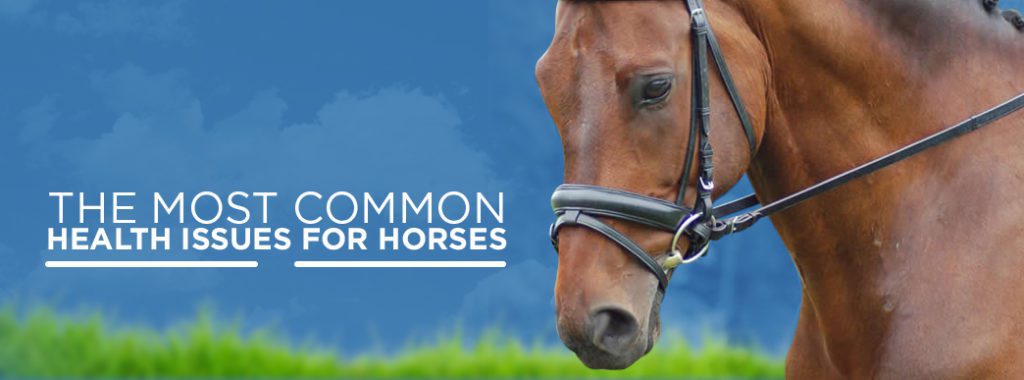
The Most Common Health Issues for Horses:
Horses and other members of the equine family — including ponies, mules, donkeys and zebras — constitute a unique species in the animal kingdom. Horses are designed to graze continuously, and keeping some type of forage in their stomachs at all times is a crucial element to maintaining a healthy and active equine digestive system.
The most common equine health problems are similar overall, despite vast differences between horse breeds and different care requirements for mares, stallions and geldings — along with special needs of horses including foals, yearlings and seniors. Understanding the factors and stressors that cause health issues in horses can give you an advantage when it comes to disease prevention.
Table of Contents
Types of Horses
Although there are numerous breeds within the horse family, ranging in size from miniature horses and ponies to draft horses like Clydesdales and Shires, most horses can be grouped according to their main purpose and current occupation:
- Broodmares and Stallions: Breeding season multiplies the stress of breeding horses, making it harder to keep your mares and stallions in top condition — before, during and after breeding. Proper preparation before breeding will increase the health of horses in your breeding program, which extends the endurance and fertility of your stallions throughout breeding season, promotes vitality in mares before the eleven-month gestation period and provides an environment for the production of strong, healthy foals.
- Mares and Foals: A foal’s first weeks largely determine its lifelong health and well-being, and proper nutrition can set a young horse on a path to success for the rest of its life. Both before and after foaling, broodmares and foals require supplements for optimum health. The foal depends on its mother for vitamin-rich colostrum and ample milk production, and the mare will require feed supplements to maintain her own condition while supporting her newborn baby.
- Performance Horses: Equine athletes, including working ranch horses as well as sporthorses, need additional care and nutrition to maintain top condition and peak performance. The increased potential for dehydration and gaps between feedings, usually induced by traveling and competitions, increase the stress of performance horses and can lead to specific horse health problems.
- Hard Keepers and Seniors: Any horse that has difficulty maintaining an ideal weight is defined as a “hard keeper” — a chronic condition that arises from one or more factors that include stomach ulcers, abscesses in the mouth, dental issues and advanced age. Horses that are hard keepers and seniors have particular dietary concerns and should be monitored more closely for any changes in weight and demeanor.
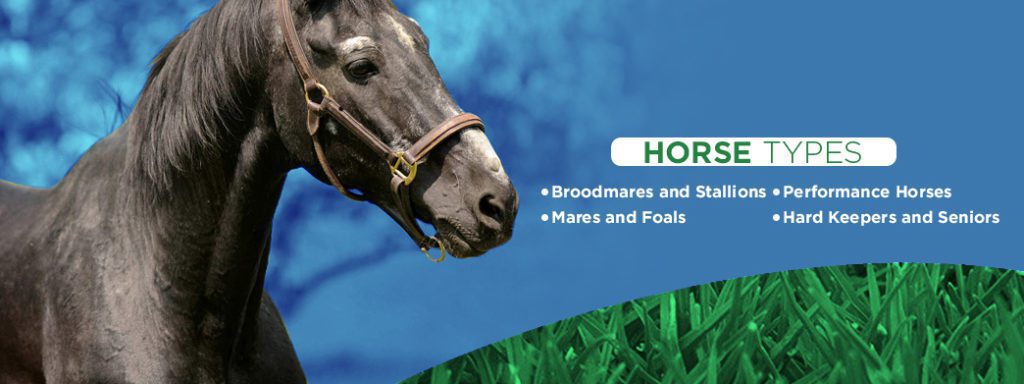 Horse Feed Requirements and Digestion Processes
Horse Feed Requirements and Digestion Processes
The digestive system of a horse is designed to work continuously, which means a horse needs to keep some type of roughage in its stomach at all times.
The feed requirements increase considerably if the horse is a performance horse, such as a racehorse or a jumper, or if it becomes part of a breeding program. Horses that experience an increase in physical activity or are kept as breeding stallions and broodmares should be given higher-calorie feeds, such as grain and oats, along with probiotic supplements to aid with digestion. Feed quantity requirements for all sizes of horses at all activity levels and in every stage of life can be calculated with a feed table chart.
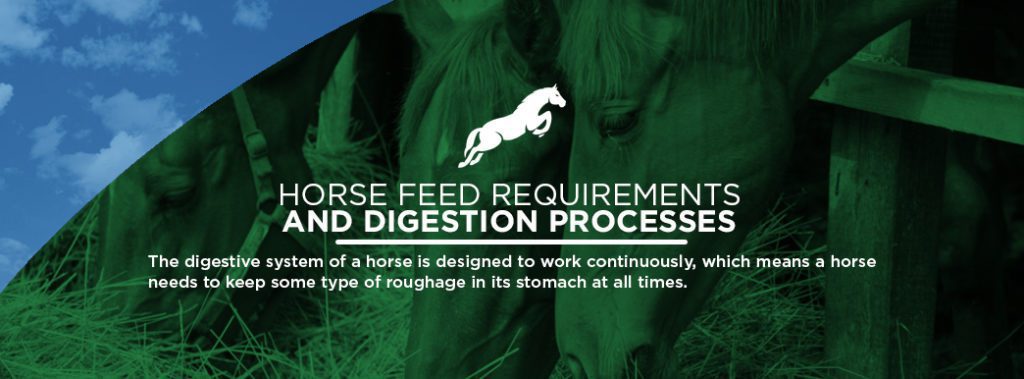 A horse’s stomach can be divided into two parts — the first portion of which is simple, like a human’s, and a more complex second portion called a cecum (or caecum). The cecum acts like a vat that employs a microbial fermentation process, similar to that of the bovine rumen, to break down fibrous material.
A horse’s stomach can be divided into two parts — the first portion of which is simple, like a human’s, and a more complex second portion called a cecum (or caecum). The cecum acts like a vat that employs a microbial fermentation process, similar to that of the bovine rumen, to break down fibrous material.
A horse’s efficient digestion system extracts every bit of nutrition and moisture content before expelling the waste byproducts as manure. Maintaining the balance of “good” beneficial bacteria in a horse’s gut helps the animal to derive the maximum nutrition from their feed.
Most Common Horse Health Problems
If the horse’s digestion system doesn’t stay in balance, several health problems can result, such as the following.
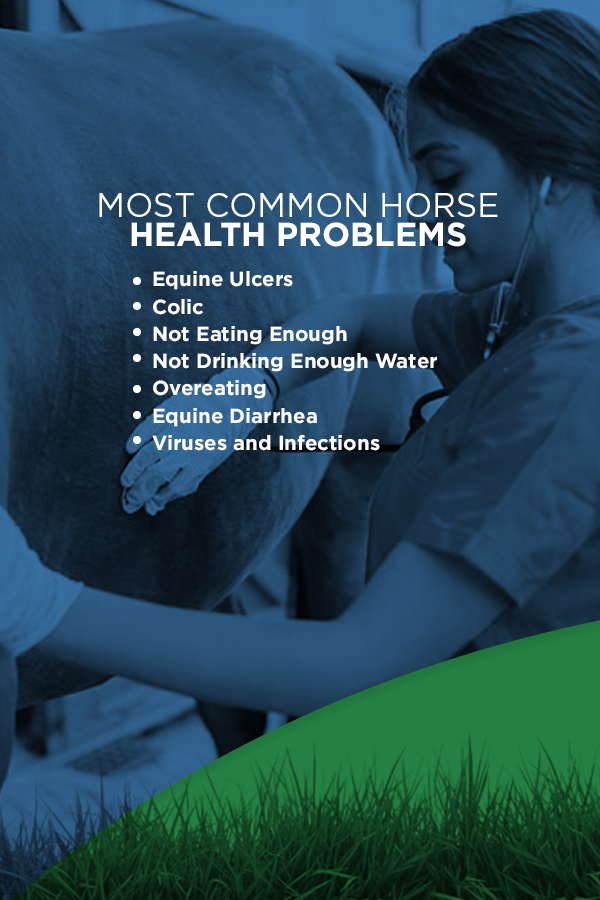 1. Equine Ulcers
1. Equine Ulcers
If a horse does not keep enough forage material in its digestive system, the stomach will shrink and push caustic stomach acid upward — creating the equine version of acid reflux. The excess acid burns the delicate stomach lining and causes painful gastric ulcers, leading to a marked decrease in appetite — which only exacerbates the problem by further reducing the amount of forage in the stomach.
Although stomach ulcers can appear in nearly every horse kept in a variety of environments and trained in numerous disciplines, this issue is especially prevalent among showhorses, sporthorses and performance horses due to hours of trailer travel, housing in stable environments and the feeding of fewer meals that are often higher in calories.
Preventing a horse from engaging in grazing behavior can have unhealthy consequences that go beyond stomach ulcers. Some reasons for these problems include:
- Standing still while grazing. Being trailered for hours at a time inhibits a horse’s natural grazing movement. Boarded horses and performance horses that must be trailered to events and shows are usually kept in stalls or small paddocks, which translates to a huge reduction in the daily distance a grazing horse usually travels. The way horses wander through pastures while grazing helps to stimulate the digestive system, providing a gentle “muscle massage” to move forage material more smoothly through the stomach and bowels.
- Pre-picked feeds. A large percentage — if not all — of a stabled or traveling horse’s diet comprises hay and cereal grains. On a long-term basis, the lack of using the teeth, flexible lips, tongue and neck muscles to pick grass can cause a chain reaction that leads to the development of serious dental problems and stomach ulcers. In addition to sharp hooks on the teeth and mouth abscesses, horses that eat from troughs and feeders are more likely to suffer from choke — a condition where a mixture of feed and saliva, called bolus, lodges in the horse’s throat and obstructs the esophagus.
- Stomach acid reflux. Horses can produce up to 16 gallons of stomach acid every day — a built-in mechanism that allows grazers to continually digest their forage. Trailered horses and performance horses on high-calorie diets more quickly consume their meals, and without roughage to occupy the stomach at all times, acid levels can increase and lead to stomach ulcers. The density and rich quality of high-calorie feeds, along with the imbalance between roughage versus digestive acids, is also likely to throw off the fragile pH balance in a horse’s stomach — leading to massive die-offs of beneficial bacteria and inducing hindgut acidosis.
- Boredom. Since horses in modern times — especially equines kept in stables or paddocks — are usually fed only two or three larger meals per day, a horse’s need to constantly nibble at grass or hay to satisfy hunger is removed. Many experts speculate that bored horses may develop harmful stable vices, such as cribbing and chewing wood.
2. Colic
One of the deadliest and most common horse ailments is colic — abdominal pain caused by an impaction in the bowels that brings the digestive system to an ominous halt. These impactions can consist of excess sand in the gut, improperly or undigested grains, parasites or a gas lock. Symptoms of colic in horses vary, but colic is always accompanied by a lack of fresh manure in the surrounding area and sure signs that your horse is uncomfortable — including pawing, biting at the side, and attempting to lie down and roll.
Horses are not designed to throw up or regurgitate, so blockages of the intestines can lead to a fluid buildup in the gut. In severe cases, the stomach may rupture. Deadly complications can occur within mere hours of the initial impaction.
If you suspect that your horse has colic, it is advisable to contact your vet immediately. Keep your horse from lying down or rolling by gently walking the animal for up to an hour, which can help to stimulate the gut and massage the impaction loose. If your horse passes manure, it’s a very good sign that the blockage has been dislodged and the digestive system is functioning again.
3. Not Eating Enough
A horse may have “gone off its feed” due to equine ulcers, pain, illness, or a dislike for the taste of a certain kind of feed. One common reason why your horse isn’t eating enough is abscesses in the mouth, which are caused by the sharp hooks of a horse’s own teeth.
Horse teeth grow continuously. Pastured horses with unlimited access to grass will wear down their teeth naturally.
When horses are given hay and other feeds that are “pre-picked” — meaning these feeds do not require the animal to tear vegetation to eat — then the growing teeth will not wear down correctly and can cause painful abscesses. A horse with abscesses loses its appetite and subsequent weight while exhibiting irritability, a behavioral change which is particularly noticeable in horses that are generally good-natured.
Another sign that a horse is suffering from mouth ulcers or abscesses is called “quidding,” when a horse chronically drops half-chewed feed material out of its mouth due to pain.
In addition to abscesses, ulcers and dental problems, other reasons that your horse won’t eat or may experience weight loss include:
- Inflammation of the gums: While feeding your horse a flake of alfalfa, have you ever encountered a sharp stalk of dry hay? So has your horse — with its gums. Even small pricks from thistles, stickers, oat hulls or random sharp points of vegetation can cause inflammation of the gums and throat.
- Choke: While horses can exhibit choke symptoms from a lack of neck muscle action while eating from a trough or bucket, choke can also occur if a horse is fed beet pulp or alfalfa pellets that haven’t been soaked. The horse’s saliva mixes with the hard pellets, causing them to expand in the throat and leading to discomfort and inflammation.
- Mycotoxin poisoning: Feeds like hay, grain or chaff can become contaminated with fungi that produces mycotoxins, and horses that ingest the contaminated feed contract mycotoxin poisoning. Mycotoxins are also commonly found in ryegrass, especially if the ryegrass pasture has been either overgrazed or overgrown and gone to seed. In addition to a sudden loss of appetite, other symptoms of horses with mycotoxin poisoning include attitude changes such as unusually spooky and aggressive behavior, barn-sour and buddy-sour tendencies, and general nervousness.
- Unpalatable feeds: Certain horses are pickier eaters than others. Some horses simply don’t like the taste of particular types of grasses, or they may be unfamiliar with the flavor of a new kind of feed and be reluctant to eat it.
- Stress: Increased activity, summer heat, breeding season, moving to a new pasture, traveling, introducing a new horse to an established herd, loud noises in the neighborhood — all of these factors may contribute to stress in your horse, increasing cortisol levels and causing a lack of appetite.
- Depression: Separation anxiety, caused by temporary time away from a working equine companion or the sale of a stablemate, may leave your horse looking and acting depressed. The horse may call out with loud whinnies and pace along fences for hours, then wander aimlessly as if lost and saddened. This depressed phase may put a horse off its feed, to varying degrees of severity.
4. Not Drinking Enough Water
Unfamiliar flavors in water or various environmental stresses can make a horse refuse to drink water. All water troughs need routine cleaning to prevent illnesses and encourage your horses to drink plenty of water on a daily basis.
Adequate water supply is crucial to the health of your horse. On average, horses consume five to 10 gallons of water daily — a minimum requirement that rises with hot summer temperatures or broodmare lactation. Water keeps a horse properly hydrated and aids the digestive system, preventing hard bowel impactions that can result in colic and other dangerous equine ailments.
In addition to providing your horse with plenty of clean drinking water, the water temperature needs to be considered. An active horse that returns from hard work in the hot sun should not be given ice cold water, which can shock the horse’s system. Likewise, in the wintertime, a horse’s water supply should be kept warm and free of ice coverings with the use of a water trough heater.
Symptoms of Dehydration
When your horse sweats, either from hard work, hot weather or both, you can assume your horse will need to be replenished with water and vital electrolytes. Water alone is not enough to restore hydration, as horses always lose essential salt and minerals when they sweat.
There are several ways to determine whether your horse is dehydrated, such as:
- Lethargy
- Dull eyes
- Dry mouth and skin
- Thick, sticky saliva
- Depression
- High protein levels in the animal’s blood
5. Overeating
The polar opposite of a hard keeper is a horse that habitually overeats, resulting in excessive weight gain and a rounded, distended abdomen that is often referred to as a “hay belly.” Even a horse with normal eating habits can become obese if it tends to be lazy, or its caloric intake surpasses its energy expenditures. Rich feeds that are high in sugar and carbohydrates can overwhelm a horse’s ability to digest and utilize nutrition, and the horse’s body will store excess calories as fat.
Overweight horses are prone to dangerous health problems, and they may colic or even founder more easily. Foundering is an inflammation of blood vessels, or laminae, in the hoof wall that can cause a painful separation of the coffin bone from the hoof wall. Once a horse founders, it becomes more susceptible to future episodes of the condition.
Severe cases of founder are called laminitis. Equine obesity is one of the leading causes of laminitis, and it can be fatal.
6. Equine Diarrhea
Loose stools or overly frequent bowel movements are signs that your horse has diarrhea, or scours, usually caused by bowel irritation. Equine scours will quickly drain a horse of vital water and electrolytes, leading to rapid dehydration that can cause weight loss, laminitis, kidney failure and toxemia. Foal diarrhea is always a concern, too, as it can quickly dehydrate and may be an indication of another disease.
The more benign causes of diarrhea include lush green grass, new types of feed that temporarily alter the gut pH balance and moldy hay. In most cases, equine diarrhea isn’t serious and may resolve itself. But if your horse has diarrhea for more than eight to 12 hours, you should contact your vet. They will need to check for more severe problems associated with equine diarrhea and administer replacement fluids.
Common causes of equine diarrhea include:
- Bacteria
- Parasites
- Potomac Horse Fever
- Coronavirus
- Ingestion of sand
- Ingestion of various toxins, such as pesticides, phosphates, toxic plants and noxious weeds.
7. Viruses and Infections
Stress or weakened immune systems put your horses at greater risk for a number of common equine diseases, many of which can be fatal. If you’re curious about how to know if your horse is sick with a virus or infection, watch for the following symptoms:
- Respiratory Infections: When a horse contracts a respiratory illness, the virus will remain with it for life. Prevention is your best defense since respiratory illnesses most commonly attack young foals, seniors and horses with weakened immune systems. The ailment may be described as a common cold for equines with symptoms including a runny nose, fever, cough, low energy, reduced appetite and breathing problems.
- Shipping Fever: Horses unused to long periods of forced inactivity may contract a pulmonary disorder called shipping fever after trailer travel. Symptoms include stiffness and lethargy, fever, foul-smelling nasal discharge and a deep cough. This condition is very serious and may be fatal.
- EHV-1 (Equine Herpesvirus, otherwise known as Rhinopneumonitis or Rhino): This equine disease can occur as a respiratory condition, but it can also attack a horse’s brain and spinal cord. EHV-1 is highly contagious and resistant to antibiotics, and infected horses become EHV-1 carriers for life.
- Rotavirus: Adult horses rarely contract rotavirus, but it is a leading cause of diarrhea in foals and can be fatal. Foals infected with rotavirus present with symptoms such as diarrhea that is watery or particularly foul-smelling and should be quarantined to avoid contact with other foals.
- West Nile Virus (WNV): West Nile Virus is a neurological disease that causes inflammation of the central nervous system — including the brain tissues and spinal cord — and can lead to paralysis, coma or death. WNV is transmitted from birds to horses and humans via mosquitoes, and mosquitoes can transfer WNV between horses and humans as well. Equine symptoms include trembling hind legs and shoulders, twitching and muscle spasms, altered mental status and paralysis.
How Zesterra Probiotic Supplement Can Help
A great way to protect your horses from common equine health issues is adding a probiotic supplement to the diet. Zesterra is an all-natural probiotic supplement that neutralizes excess stomach acid, balances digestive pH levels, boosts the equine immune system, encourages proper appetite and water consumption, prevents ulcers, contributes to overall gut health and reduces horse stress. Zesterra also includes beneficial ingredients such as colloidal silver to help promote healthy immune systems by managing bad bacteria in the gut.
See our full line of Zesterra products for horses. For more information about Zesterra, submit your questions via this contact form and one of our friendly experts will help you. We also carry CattlActive, a probiotic formula designed for cattle.

